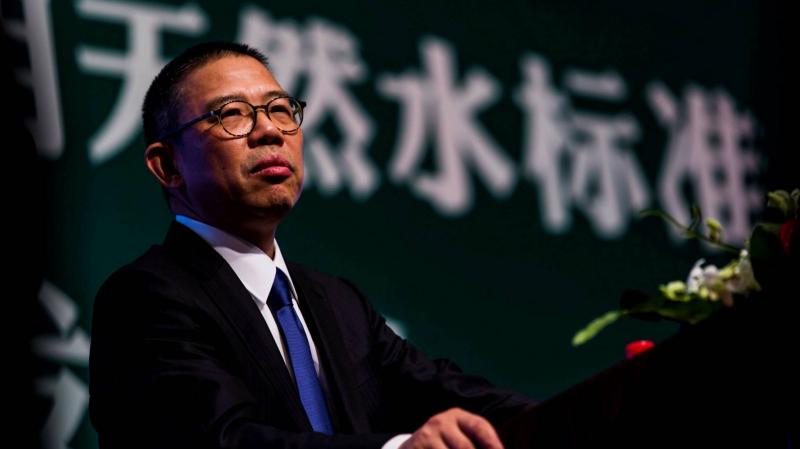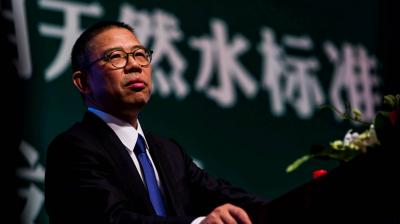The richest man in China is at risk of losing his top position that he has held for nearly three years, following a significant decline in his wealth among billionaires worldwide due to increased competition and issues surrounding the reputation of his bottled water company. Zhong Shanshan, chairman of Nongfu Spring based in Hangzhou, has lost up to $13 billion so far this year, reducing his wealth to $54.8 billion as of yesterday, according to the Bloomberg Billionaires Index. This keeps him above Colin Huang, the founder of the online shopping platform PDD Holdings, whose wealth stands at $47.3 billion.
**Why Did Zhong Shanshan's Wealth Decline?**
The potential shift in the billionaire index ranking is attributed to increasing complexities facing investors in the consumer goods sector, where companies are finding it increasingly difficult to continue operations due to an economic slowdown and intensifying competition from emerging brands. Nongfu, which is listed on the Hong Kong Stock Exchange, is facing a price war in its core bottled water business and has found itself in an unfavorable position with Chinese consumers who have heightened nationalistic and health-conscious sentiments in recent months. This has led to the company's stock declining by nearly 20% since February 1, compared to about 6% growth for PDD, known for its low-priced products and bold deals.
Ada Li, a consumer analyst at Bloomberg Intelligence, stated that these concerns likely arose from several factors, including "recent issues with the Consumer Council in Hong Kong regarding product quality, mounting competition in the sector amid declining consumer spending, and a boycott that occurred at the beginning of this year due to concerns over business practices."
Most of Zhong's wealth comes from his stakes in his beverage company, alongside Beijing Wantai Biological Pharmacy Enterprise Co. Nongfu did not immediately respond to requests for comments yesterday regarding its founder's wealth or any setbacks faced this year.
**Harsh Criticism for Zhong and His Company**
Earlier this year, the company, as well as Zhong himself, faced a torrent of criticism following the death of Zhong Qinghou, the founder of the main competitor, Hangzhou Wahaha Group, in February. After his death, online sympathies turned into an attack on Nongfu, with some criticizing the design of its bottled water packaging as appearing Japanese, while others repeated claims that Nongfu used tricks to gain an advantage over Hangzhou Wahaha. Some users alleged that Zhong's son holds a U.S. passport and questioned the family's loyalty to China, leading to increased sales for Wahaha at the expense of Nongfu. The bottled water company denied some allegations and announced legal action against those who spread malicious rumors, but many Chinese internet users remained unfazed.
The United Kingdom is set to lose 9,500 millionaires this year, more than any other country in the world except China, according to a new report on the migration intentions of the world's wealthy.
In April, China Resources Beverage Holdings submitted a listing application on the Hong Kong Stock Exchange, aiming to provide additional resources for its bottled water brand C'estbon, which is one of Nongfu's largest competitors. Shortly after, Nongfu launched a new pure water product directly competing with C'estbon, significantly lowering prices. The product is sold for less than one yuan per 550-milliliter bottle on Tmall, a platform under Alibaba Group Holding, which is less than half the normal retail price.
**Nongfu's Profit Decline**
Although Nongfu recorded better-than-expected profits last year due to strong sales of ready-to-drink tea, the revenue share from bottled water decreased to 47.5% from 54.9% in 2022, highlighting increased competition in the bottled water sector. At the same time, the Consumer Council in Hong Kong announced a new challenge last week concerning Nongfu's water containing the maximum allowable level of bromates, which could pose health risks with excessive consumption. The company's shares fell by 7.3% over two trading days before the council clarified that its preliminary results stemmed from evaluating Nongfu's water using standards meant for another category. Shares rose after the council's apology but then fell again on Friday.
Nongfu announced in early July that Zhong intends to buy around $256 million worth of shares in the company through Yangshengtang, a holding company he controls, to boost confidence in the bottled water giant. Subsequently, Yangshengtang purchased about 3.5 million shares on July 9, according to regulatory disclosures.




